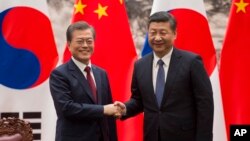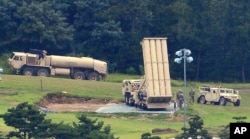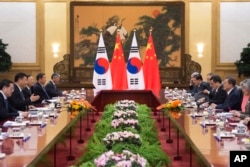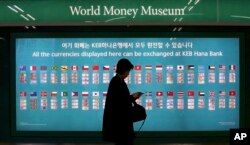For his first state visit to China, South Korean President Moon Jae-in came with an entourage of more than 300 business people, an actress who is wildly popular here and heartthrob boy band EXO, which sings in both Korean and Chinese.
The charm offensive was aimed at helping get frosty trade relations back on track, analysts said.
While the liberal-leaning South Korean leader is in sync with China and its approach toward North Korea - leaning heavily against military action - he hasn’t given ground to Beijing on his country’s deployment of the U.S.-made Terminal High Altitude Area Defense (THAAD) missile system.
A friendlier South Korea
That is a stance China now appears to have learned to stomach in exchange for a friendlier South Korea, some analysts said.
“They [China] don’t want to see South Korea driven to making security deals with Japan. They don’t want to see South Korea driven to nuclearize, which is often discussed although it’s [a] very long shot,” said David Kelly, who leads research at Beijing-based strategic advisory group China Policy.
“They are also concerned about the Indo-Pacific [strategy] and the Quad [United States, Japan, Australia and India] and South Korea would be a target in that. So, better to have a warm and friendly South Korea,” he added.
Kelly said it appears that a new deal has been cut as China is no longer objecting to the anti-missile system.
Part of the reason for that, he adds, is that Beijing realizes that South Korea is not going to budge on the issue.
"Both Koreas are in the situation of needing to keep these strategic equalizers; it’s a nuclear one in the northern case, and it’s this high-tech [missile] detection system [in the South]," Kelly said.
Relations began to sour last year after South Korea agreed to deploy the anti-missile defense system to help shield itself from a possible attack from the North.
Sanctions issue
China believes the system is a threat to its own security and rolled out punishing economic sanctions on Seoul in response when the system was deployed earlier this year.
The punitive measures included a ban on group tours to the South. South Korean pop stars weren't allowed on Chinese television shows, wildly popular Korean soap operas were banned and sales of Hyundai and Kia autos plummeted.
Those sanctions impacted trade and tourism and some of South Korea’s biggest companies, including Lotte, which owned the plot of land used for the missile system’s deployment.
Although the general public in China agreed with its government and believed that the defensive missile system is aimed at China instead of North Korea's growing nuclear threat, the boycott and government's heavy-handed approach, ironically, were not welcomed by all Chinese.
“[We] don’t like such top-down restrictions, imposed by the government. The government could have taken a guiding approach, but it shouldn’t have cut off [the ties] on our behalf,” a man surnamed Hu told VOA.
“We still live normal lives and do whatever we like. There’s not been a big impact on our lives. However, if [South Koreans] have posed a huge threat to us, we will still side with our own government,” said one woman surnamed Wang.
With China now reversing its earlier course, a fresh start in its relationship with South Korea appears to be in sight.
By using its economic clout, China has also succeeded in drawing South Korea closer to its strategic approach toward North Korea.
A restart in sight?
During their third summit meeting on Thursday afternoon, Moon and Chinese counterpart Xi Jinping reached a four-point consensus, according to South Korea media.
Both countries agreed that dialogue and negotiations should be re-started to facilitate the North’s denuclearization on top of an aim to improve relations between both Koreas.
Their first emphasis on ruling out the use of military force, however, has highlighted a salient and growing division between Seoul and Washington, according to Clint Work, a foreign and national security writer for current affairs magazine The Diplomat.
“Everyone’s official policy is the denuclearization of North Korea. But we see on the part of Beijing and Seoul, and this is not a new thing, but we see them constantly stressing that war is not an option, a solution to this issue. ‘We must preserve peace, no matter what’ is the first principle. This is something that you don’t hear, coming from Washington, D.C..,” Work told VOA.
The U.S. has never ruled out military action against Pyongyang, with President Donald Trump having called Moon’s pro-dialogue policy “talks of appeasement” with North Korea.
Work, however, disagreed that China has put its THAAD dispute with Seoul on the back burner. On the contrary, he says he believes that China still aims at an eventual removal of the anti-missile system.
"Despite their dispute being far from settled, Moon has to seize the opportunity to re-engage China after Beijing used its economic clout to seriously punish Seoul over THAAD", Work said.
Work notes that according to Hyundai Research estimates, China-imposed sanctions might have cost Seoul $7.5 billion in the first 10 months of this year, about 0.5 percent of its GDP, although overall South Korean exports to China still rose 12 percent to $88.1 billion between January and August.
Re-normalizing ties with China will always spell good news for the South Korean economy, although economic benefits from better ties shouldn’t be overstated, given the South Korean economy is facing a range of structural challenges itself, Work added.










